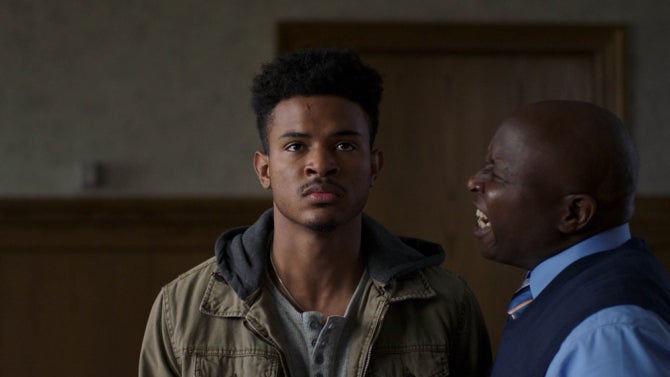
[brightcove:5349512561001 default]
If you exist outside of the Greek world, and certainly if you attended a predominantly white university as a student of color, Greek life swirls around you.
You may be familiar with probates and socialize with friends who are members of sororities and fraternities, but you stay along the outskirts of it all. In his feature film debut, director Gerard McMurray peels back the curtain on Black Greek life in a shocking and riveting film about brotherhood, sacrifice and the freedom of individual choice.
Burning Sands follows Zurich (Trevor Jackson), a college student at the fictional Fredrick Douglass University, trying to survive Hell Week as a Lambda Phi pledge. With his academic work, girlfriend and social life all on the back burner, Zurich attempts to press forward with the hopes of making it through Hell Night; capturing the glory that is awaiting him on the other side.
Subscribe to our daily newsletter for the latest in hair, beauty, style and celebrity news.
We’ve all heard whispers about the hazing that occurs when pledging various Greek organizations, but it’s mostly unspoken, remaining below ground and so ingrained in the tradition that it’s never shown the light of day unless some major trauma or tragedy strikes. As he moves through Hell Week with his fellow pledges, enduring beatings, emotional abuse and so forth, Zurich begins to question his commitment to it all. His Big Brothers are ferocious and unrelenting in their punishments. Moonlight’s Trevante Rhodes, Segun Akande, and Rotimi star as Big Brother Fernander, Malcolm, and Edwin respectively. Their physicality, as well as their near constant taunting keeps the pledges on edge.
And yet, if you watch Burning Sands (or simply try to analyze the film’s trailer) focusing solely on the trauma that Zurich and his line brothers endure, you would be missing McMurray’s entire point. Shot over the course of eighteen days on the Virginia State University campus, Burning Sands tells a story about Black brotherhood and what it means to belong to something much bigger than yourself. The hazing is admittedly horrible, and I would be naive to think that there is no truth to these volatile acts. However, it is not every story; nor is it the thread that makes this film so powerful. Instead, Burning Sands is a coming of age story about legacy, bonds, and the choices that shape us forever.
McMurray and his co-writer Christine Berg get a great deal right here. That delicate time of being a late teen or early twenty-something, just at the door of real adulthood but in many ways sheltered from the actual realities of the world is fleshed out beautifully. Scenes like the probate on the quad, the frat parties, or even the normalization of sex between Zurich and his girlfriend, Rochon (Imani Hakim) are hardly ever seen on screens featuring Black people; certainly not to the degree to which McMurray chose to showcase them here.
The women in this film are another bright spot. Legendary actor Alfre Woodard stars as Professor Hughes, an Africana Studies instructor who takes an interest in Zurich and is able to walk that delicate line between discretion and support amongst the politics and bureaucracy in an institution of higher education. She tells him pointedly in one scene, “It is easier to build strong children than repair broken men.” Zurich’s female peers are also worth considering.
Though the women in Burning Sands aren’t perfect characters, they are given a ton of agency. Rochon freely expresses her displeasure with Zurich’s actions and treatment towards her during Hell Week. However, she also has her own life and it’s clear that her happiness does not revolve around him or her relationship status. I was immediately apprehensive about Toya (Nafessa Williams), another leading female character until I recognized that my judgment of her had more to do with my personal journey as a woman than hers. Instead of casting her as a typical, “around the way girl” Toya’s sincerity, overt sexuality and frankness make her a fully fleshed out and vibrant character.
The film is not perfect, the violence and the lack of humanity shown by many of the Big Brothers draw definite and uncomfortable ties to slavery. (Big Brother Fernander is the only Lambda to intervene subtly on behalf of the pledges on more than one occasion.) Likewise, the ending nearly falls flat and yet, the film is extraordinary because it reveals the desire Black men have to carve out a safe space for themselves in a world that is constantly closing in on them.
More than anything Burning Sands is a riveting assessment of freedom, compassion and what it means to think critically about the circumstances you may find yourself in. For Zurich, it’s about crossing those burning sands into manhood.
Burning Sands premieres Friday, March 10 in theaters and on Netflix.




